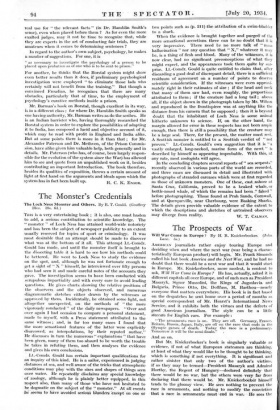Prison Reform
Prisons. By M. Hamblin Smith. (John Lane. 2s. 6d.) -The English Borstal System. By S. Barman. (P. B. King. Its.) 'DR. HAMBLIN SMITH has behind him a career of more than thirty-five years as a medical officer in English prisons. He is well known for his work in the field of criminal psychology, 'where he has taken a lead in endeavouring to apply modern psychological ideas. Much that he has written concerns only the specialist, but here in a small volume full of terse argument and succinct suggestion he makes direct appeal to the man in the street.
After a couple of historical chapters. he devotes a chapter apiece to examining the value of prisons from the stand- point Of retribution, deterrence, and refOrmation respectively. Some of his more important points are made a little at haphazard. It is at the end of his first historical chapter that we come on a briefly luminous discussion of the problem of prison labour ; and towards the end of the second, that he argues for having prisoners who are capitally sentenced " at once removed to an institution reserved for such cases." Why the latter policy has not been carried out by the Prison Commission has long been a subject of wonder to the present reviewer. Its advantages seem so obvious, and its cost, though appreciable. not out of the way. Every experienced official seems agreed about the bad effect which executions in a prison have on the other prisoners.
Partly up and down his pages, as in the examples shown, and partly in a concluding chapter, where some of his threads are drawn together, Dr. Hamblin Smith makes a number of suggestions for reform. Many concern in the first instance the courts rather than the prisons ; for he would seem in accord with the recent dictum of the Secretary of the Prison Commission, that for the major developments of the future in our prison system we must look, not to the Prison Com- missioners, but to Parliament and the Courts." Thus he would have probation officers better trained, and arrange that none among them should have to supervise so many cases as now too often happens. Thus, again, lie would meet the admitted evil of short sentences by abolishing the present power of courts to impose them :
" Courts continued to impose sentences of three days until they were prevented from doing so by law. There is, in my judgement, good reason for the legal abolition of sentences of less than three months."
Further, in courts of summary jurisdiction
" If the court decides after due consideration that imprisonment is the only way of dealing with any given case it should not be allowed to impose sentence of imprisonment then and there. The case should be adjourned until such time as the court can be placed in full possession of all the relevant facts, including the results of a study of the offender's personality."
This is an excellent suggestion, but does it go far enough ? Why should magistrates alone be called on to wait for such indispensable data ? Why not recorders and chairmen of quarter sessions Why not even " red " judges ? Moreover, why leave the determination of the sentence of imprisonment to the " beaks " at all ? How many of them will have any
real use for " the relevant facts " (in' Dr: Hamblin Smith's sense), even when placed before them ? As for even the more exalted judges, may it not be time to recognize that, while they are experts in the art of conducting fair trials, they are amateurs when it comes to determining sentences ?
In regard to the author's own subject, psychology, he makes a number of suggestions. For one, it is " as necessary to investigate the psychology of a person to be placed upon probation as of one who is to be sent to prison."
For another, he thinks that the Borstal system might show even better results than it does, if preliminary psychological investigation were employed " to eliminate those lads who certainly will not benefit from the training." But though a convinced Freudian, he recognizes that there are many obstacles, particularly that of time, to the employment of psychology's curative methods inside a prison.
Mr. Barman's book on Borstal, though excellent in its way, is in a different class ; for where Dr. Hamblin Smith speaks as one having authority, Mr. Barman writes as do the scribes. He is an Indian barrister who, having thoroughly researched the Borstal system in order to explore the possibilities of adapting it to India, has composed a lucid and objective account of it, which may be read with profit in England and India alike. But at some points there is more in it than that ; for Mr. Alexander Paterson and Dr. Methven, of the Prison Commis- sion, have alike given him valuable help, both generally and in details. Mr. Paterson (who has, of course, been largely respon- sible for the evolution of the system since the War) has allowed him to see and, quote from an unpublished work on it, besides contributing an important Introduction. The book therefore, besides its qualities of exposition, throws a certain amount of light at first hand on the arguments and ideals upon which the















































 Previous page
Previous page